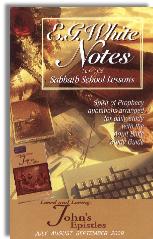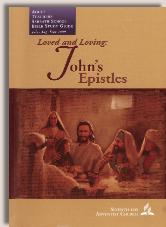|
||||||||||||||
Commentary on "Living as Children of God"
Day 1: Sabbath Afternoon, August 8, 2009
The introductory lesson for this week on living as children of God, includes a modern parable. The parable seems to indicate that no matter what the son does, he will be the heir of the father. Although this may be true of the salvation that we receive as Christians, the Seventh-day Adventist Church teaches quite a different message. Not only is the message different as taught in various places within the Church, but as we will see as we progress through this week's lessons, we will see that this very teaching is negated by the last day's lesson, on Friday.
At the bottom of the page for today's lesson, there are a number of questions that are asked. As we proceed through the week we will be looking at the answers, and at the questions themselves. The questions that have been provided are not bad questions, but they are phrased in such a way, and the answers that are provided in the Quarterly are phrased, such that the answers that are derived must be in accordance with SDA theological positions.
Christians have been answering these questions for 2,000 years using scripture, the SDA Church has been providing answers to these questions for a mere 150 years that are not always in harmony with Christian teaching. The scripture passages that are provided by the Quarterly have become “proof texts.” We will be looking at other scriptural answers to these questions, not because the scriptures used are bad, but because they have become overused in the context of SDA Sabbath School studies, at the expense of ignoring other, very plain scriptural passages that provide powerful answers.
Remembering the lesson for last week, we will be careful to only use the Bible and the Bible alone, to discover the leading of God for our lives.
Summary
- The parable for today's lesson condradicts Adventist teaching about how one's behavior affects one's relationship with the Father, and one's salvation status.
- Avoid “proof texts,” overused Biblical phrases and verses that have, sometimes transparent, layers of theological understanding not intended in the original context.
- Stick with the Bible for answers to questions this week. Don't use “pet” passages for answers, but find fresh expressions in God's word for his answers to the questions raised in this week's study.
Day 1: Sabbath Afternoon, August 8, 2009
Overview
“The student will –
Know: Understand that we are God’s children and are called to be like Him.
Feel: Be enveloped in God’s love.
Do: Respond to God’s love by resisting the temptation to sin.” (From the Teacher’s Comments section.)
Problems: This week’s lesson covers one of the great passages in the Bible, 1 John 3:1-10, and there are several places where the author does a good job of explaining the various texts used in the study.
However, I was left flat by the introduction. The story of the faithful dog and messy son didn’t do anything for me. I thought I was missing something. Clearly, the author was trying to make a point that I wasn’t getting. This was my problem, not the author’s.
Then, I read the Teacher’s Comments and paid more attention to the learning objectives. A couple of things became clearer. First, the entire lesson turns out to be an appeal to stop sinning (as much as possible) rather than about my identity as a child of God. This helped me figure out the dog and child story: Even though I started my Christian life as a very messy child of God, He expects me to grow up and mature. The definition of “grow up and mature” is “stop sinning”.
Second, the inexpressible love of God is reduced to emotion, something I’m supposed to feel.
Third, based on the call to be like Him (by not sinning) and to feel His love, I am supposed to respond by resisting the temptation to sin.
I’m not trying to pick nits here. These are the stated objectives, and Friday’s final quote from The Great Controversy serves as the capstone of the author’s arguments. The difference between this lesson and several similar lessons and articles I’ve read from other denominations is the Ellen White quote, nothing more.
The vast majority of religious people believe their lives are to be consumed with trying to measure up, to behave, to stop sinning, to somehow win the battle with their flesh. All of these people believe they were saved solely by God’s grace to start, but that they can lose their salvation if they fail to measure up, behave, stop sinning or win the battle with their flesh.
Is it any wonder that these people experience the same, or even higher, rates of depression as non-Christians? Their belief system is doomed to failure.
And what are they to say to the non-believer? “Come to Jesus and be miserable like me.” Or, how about, “Ignore the fact that I’ve been divorced and remarried several times, my kids are a mess, I’m on antidepressants, I’m racist, I’m sexist, I cheat on my taxes: In short, ignore that I’m exactly like you and just accept this truth I’m offering.” Or, “I keep the Sabbath. You should too, or you’ll be lost.”
A big part of the answer to the dilemma is found in these very verses, 1 John 3:1-10, but so few churches admit the truth and teach accordingly that their members wallow around in constant failure – continuing day after day to soil their clothes like the baby son in the story, becoming ever more fearful of the God Who has every right to destroy them for their failure.
The late Major Ian Thomas said it far better in his preface to the book Classic Christianity.
…There are those who sincerely try to live a life they do not have, substituting religion for God, Christianity for Christ, and their own noble endeavors for the energy, joy, and power of the Holy Spirit. In the absence of reality, they can only grasp at ritual, stubbornly defending the latter in the absence of the former, lest they be found with neither…
There are those who have a life they never live. They have come to Christ and thanked Him only for what He did, but do not live in the power of who He is. Between the Jesus who “was” and the Jesus who “will be” they live in a spiritual vacuum, trying with no little zeal to live for Christ a life that only He can live in and through them, perpetually begging for what in Him they already have!
Summary
- This week’s study covers a wonderful set of verses and the author of it gets quite a few things right biblically.
- As usual, though, the Adventist “need” to ignore almost everything except behaviorism wins out in the end.
Copyright 2008 BibleStudiesForAdventists.com. All rights reserved. Revised August 10, 2009. This website is published by Life Assurance Ministries, Glendale, Arizona, USA, the publisher of Proclamation! Magazine. Contact email: BibleStudiesForAdventists@gmail.com.
The Sabbath School Bible Study Guide and the corresponding E.G. White Notes are published by Pacific Press Publishing Association, which is owned and operated by the Seventh-day Adventist church. The current quarter's editions are pictured above.
Official Adventist Resources
Standard Edition Study Guide Week 7
Teacher's Edition Study Guide Week 7
Easy Reading Edition Study Guide Week 7
Search the Complete Published Ellen G. White Writings


